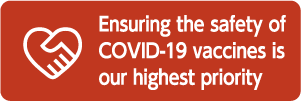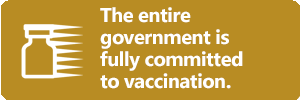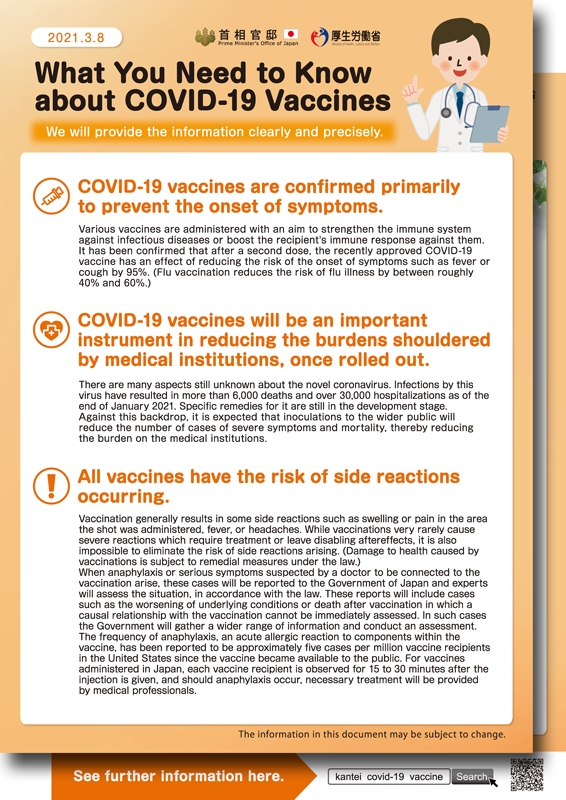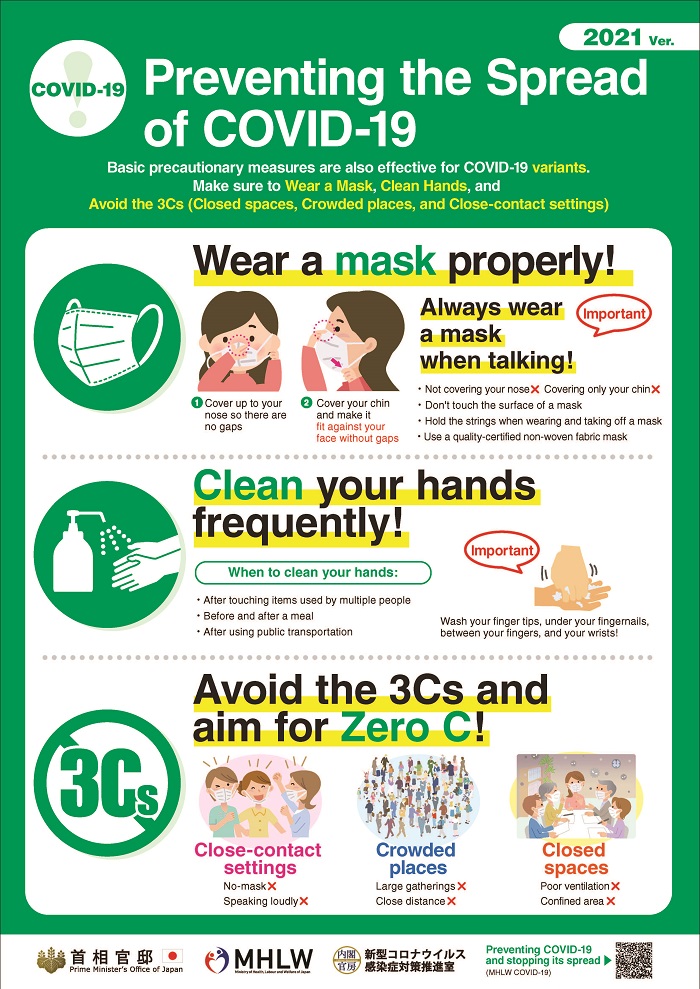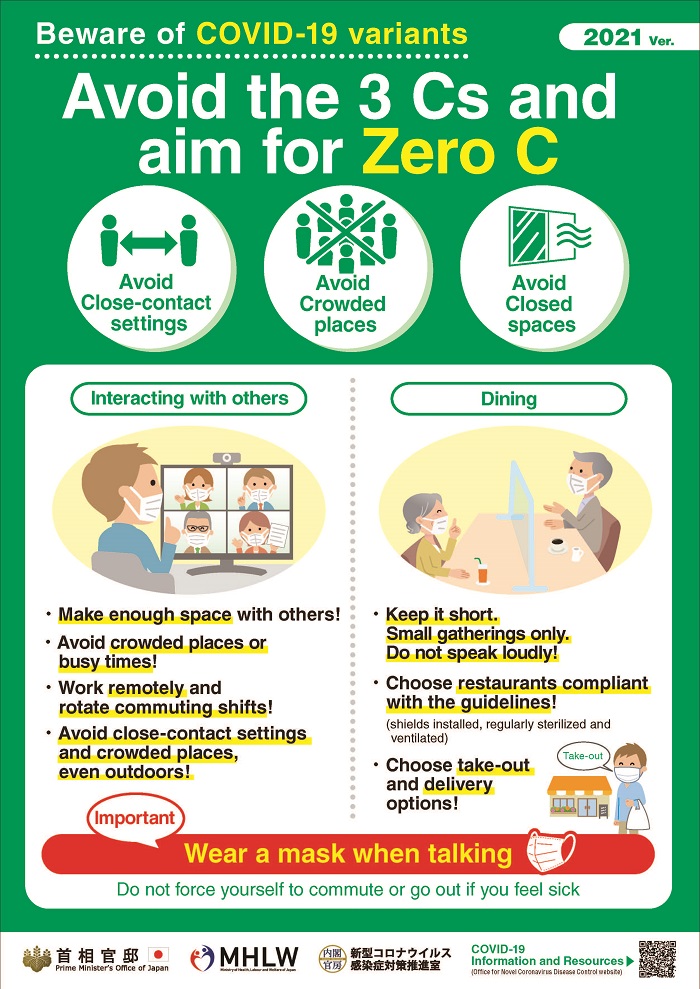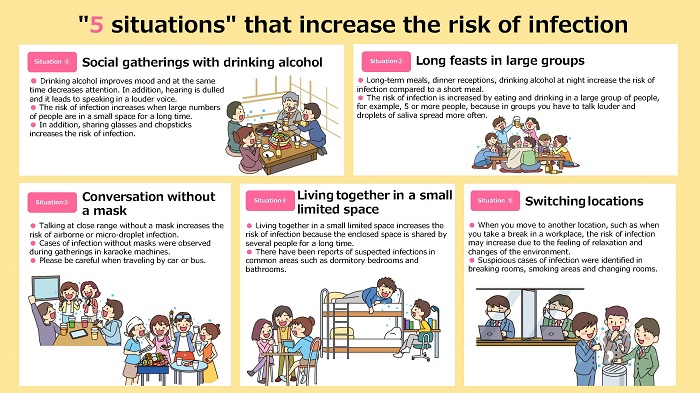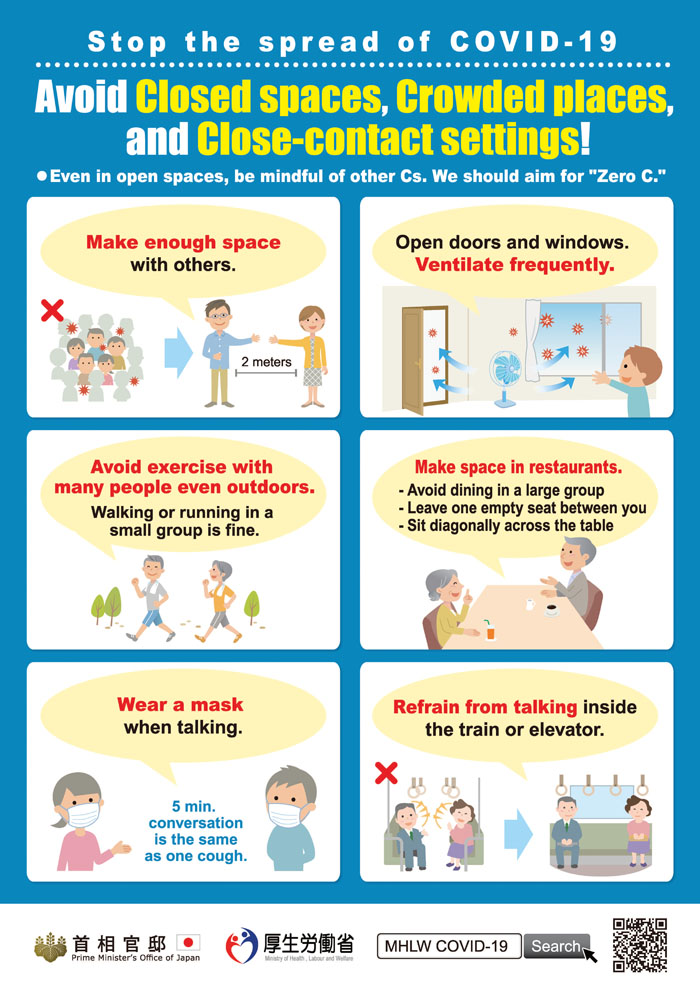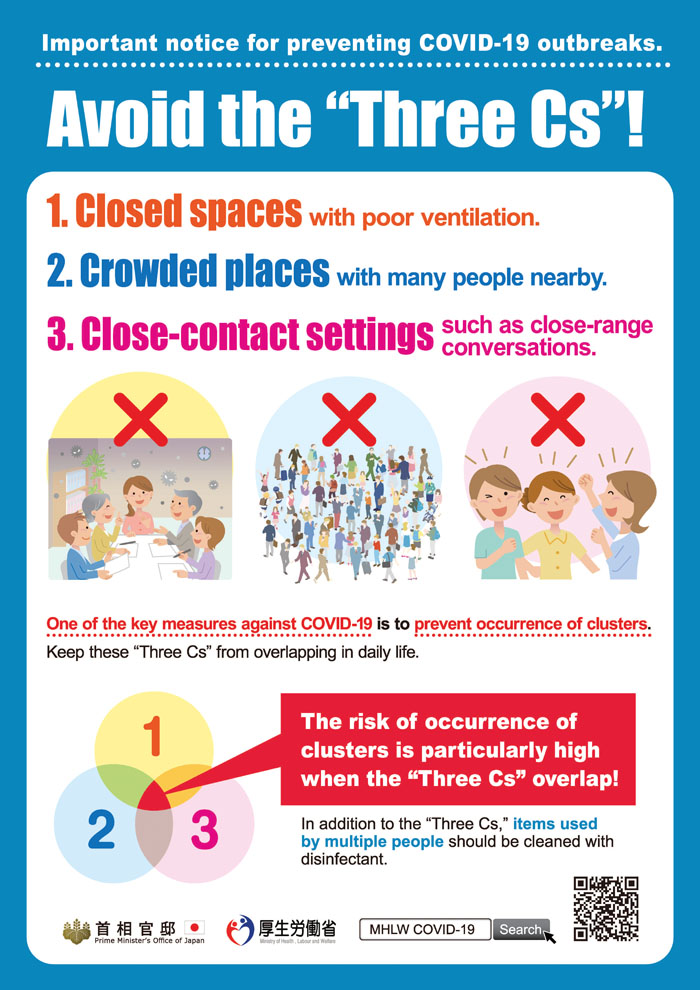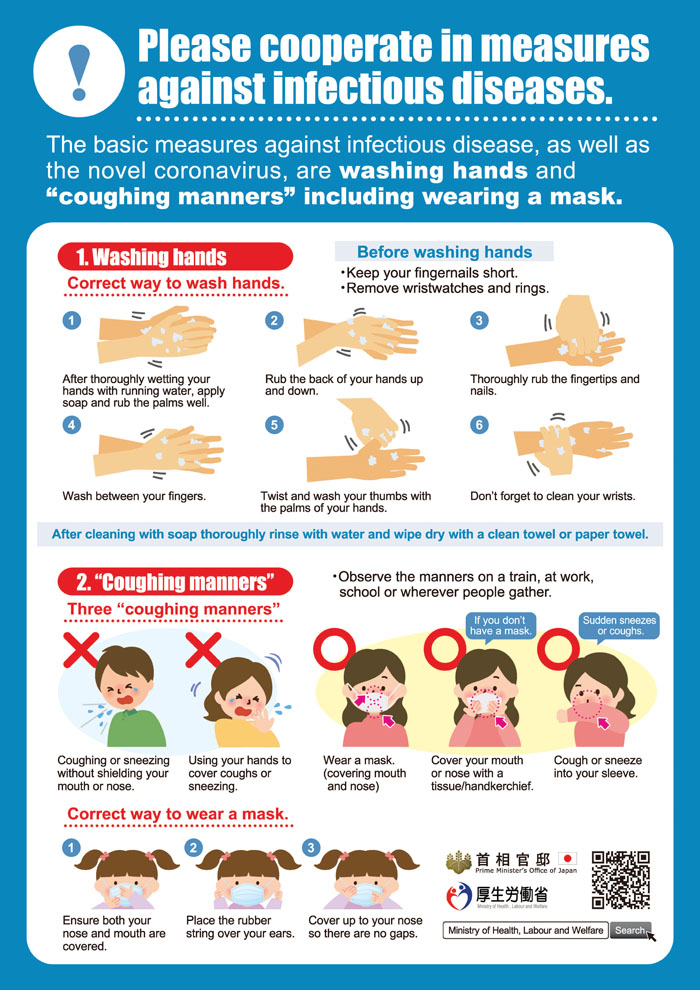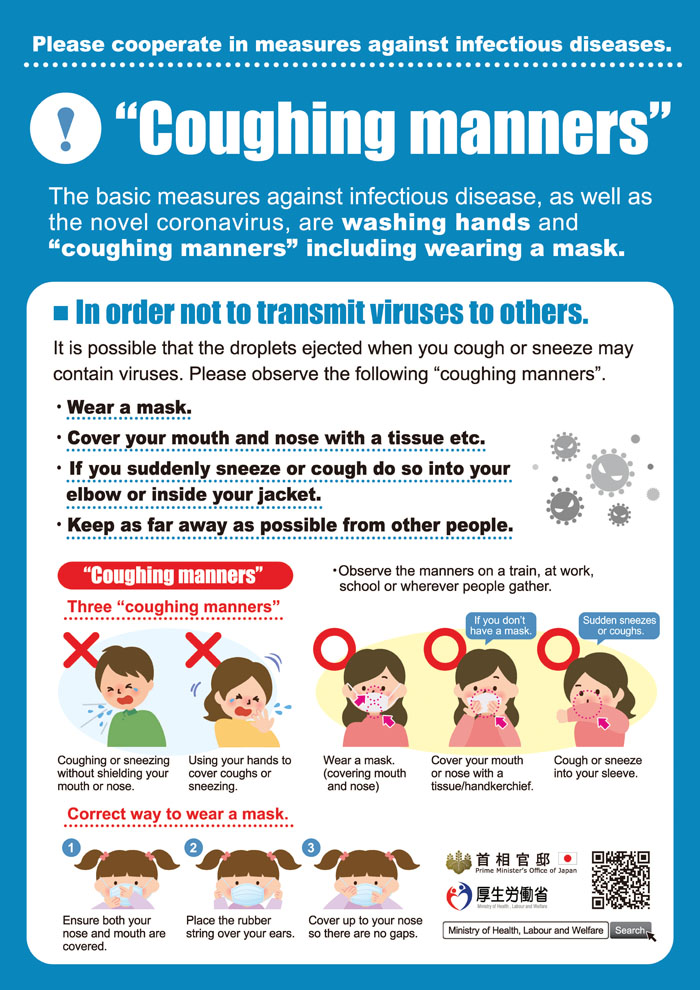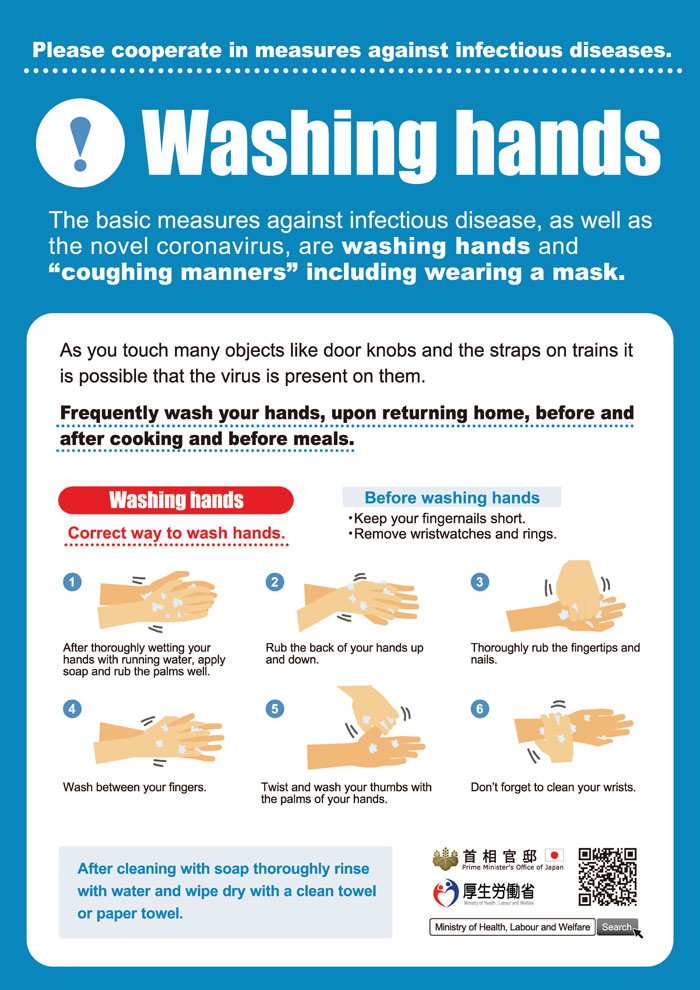Home > Ongoing Topics > COVID-19 Vaccines
Ongoing Topics
COVID-19 Vaccines
https://www.mhlw.go.jp/stf/seisakunitsuite/bunya/0000164708_00079.html
Total number of vaccine doses administered to date (as of April 1, 2024)*: :436,193,341
Incremental changes from March 26, 2024: +174,966
(Vaccinations since autumn 2023: +169,073)
Total number of vaccinations since autumn 2023**:
| Number of vaccine doses | Vaccination rate |
|---|---|
| 28,461,681 | 22.7% |
Breakdown of the total number of vaccine doses***:
| Number of vaccine doses | Vaccination rate | |
|---|---|---|
| Total number of vaccine doses: | 436,193,341 | - |
| First dose | 104,753,261 | 80.4% |
| Second dose | 103,464,961 | 79.5% |
| Third dose | 86,697,731 | 67.1% |
| More than four doses | 141,277,388 | - |
* Total number of vaccine doses administered on or before March 30, 2024, including all (first ~ seventh) doses
** Vaccinations since September 20, 2023.
*** Beginning with the data released on September 26, 2023, the population data used to calculate the percentage of the population that has been vaccinated has been updated based on the Basic Resident Registration data as of January 1, 2023. In addition, in calculating the percentage of the population that has been vaccinated, all doses administered before 2023 and doses administered to those who have died are excluded.
Videos
Index

COVID-19 vaccines have shown substantial effects.
- It has been confirmed that after a second dose, the COVID-19 vaccine administered to you has an efficacy of roughly 95% in reducing the risk of developing symptoms (the onset of symptoms) such as fever or cough.
- The vaccine has been confirmed as being highly effective in preventing the onset of symptoms even in the elderly and people with underlying health conditions such as high blood pressure or diabetes.

COVID-19 vaccines will not only benefit you but also be an important instrument in reducing the burdens on medical institutions.
- Many aspects of COVID-19 remain unknown. By the end of April 2021, roughly 590,000 people in Japan have been diagnosed with COVID-19 infections, of which more than 10,000 people have died. (The percentage dying or needing intensive care is approximately 1.6% [0.3% for people under 60 years of age and 8.5% for people aged 60 or above].)

The Government recommends that people get vaccinated because the benefits of vaccination are greater than the risk of side reactions.
- Vaccination may result in the body reacting to the vaccine through local reactions that include pain in the area where the shot was administered and systemic reactions such as fever or headaches. These reactions are more frequent after the second dose than the first dose and the older the recipient is, the less frequently they occur. It is best to be vaccinated when your physical condition is essentially fine and to take things easy after receiving the vaccine.
- People with a history of severe allergic reactions, including anaphylaxis, will be observed for longer than usual (30 minutes) after the injection is given, and should anaphylaxis occur, necessary treatment will be provided by medical workers.
- The Government recommends that people get vaccinated because at present, serious safety concerns have not arisen and the benefits of taking the vaccine outweigh the drawbacks of side reactions.

The Government will continually confirm the safety of the vaccines and provide safety-related information.
- When granting approval to the COVID-19 vaccine, the Government examined comparative trials (clinical trials) involving tens of thousands of people in total to confirm that serious side reactions did not occur after vaccination. In order to continually confirm vaccine safety even now that approval has been granted, when anaphylaxis or serious symptoms suspected by a doctor to be connected to the vaccination arise, these cases will be reported and experts will assess the situation, in accordance with the law. These reports will include cases such as the worsening of underlying conditions or death after vaccination in which a causal relationship with the vaccination cannot be immediately assessed. In such cases the Government will gather a wider range of information and conduct an assessment.

The COVID-19 vaccine will be available free of charge.
- The costs of vaccination for all Japanese nationals and all eligible foreign residents, will be covered in full by public funds.
- Vaccines will never be administered without the recipient’s consent. We urge the public never to coerce vaccinations at the workplace or upon others around them, and never to treat those who have not received the vaccine in a discriminatory manner.

The entire government is working in an all-out manner to expedite vaccinations.
- The Government will make all-out efforts to provide local governments with enough vaccine doses by the end of June to enable all elderly persons desiring it to receive their second dose, with the end of July in mind. We will also begin broadly inoculating the general public, including people with underlying health conditions, starting from those municipalities that have prospects for finishing vaccinations of the elderly.

For more information
-
Ministry
of Health, Labour and Welfare COVID-19 Vaccine Website (Japanese Only)
Ministry of Health, Labour and Welfare COVID-19 Website (English) - For detailed information related to COVID-19 vaccination, please visit the website of the prefectural government of your place of residency.



